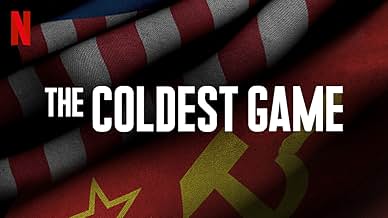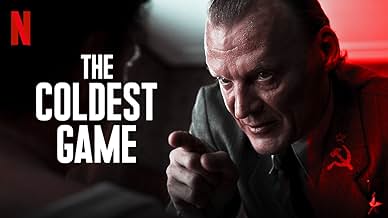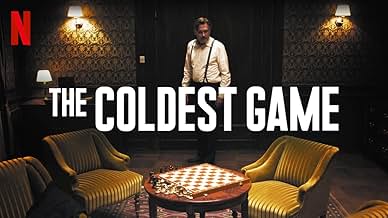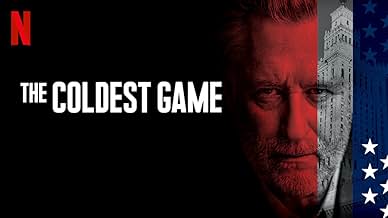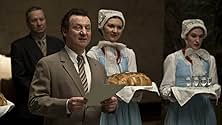VALUTAZIONE IMDb
6,2/10
13.133
LA TUA VALUTAZIONE
Durante la crisi missilistica cubana del 1962, un genio della matematica si ritrova arruolato per giocare a una partita di scacchi tra Stati Uniti e Unione Sovietica e una partita mortale di... Leggi tuttoDurante la crisi missilistica cubana del 1962, un genio della matematica si ritrova arruolato per giocare a una partita di scacchi tra Stati Uniti e Unione Sovietica e una partita mortale di spionaggio.Durante la crisi missilistica cubana del 1962, un genio della matematica si ritrova arruolato per giocare a una partita di scacchi tra Stati Uniti e Unione Sovietica e una partita mortale di spionaggio.
- Regia
- Sceneggiatura
- Star
- Premi
- 3 vittorie e 13 candidature totali
Recensioni in evidenza
Right off the bat (or board?), there is the fact that this is or rather was based on true events. You'll either be into that or not. Bill Pullman does everything to keep you engaged though. The movie or rather the story is a bit muddled and there certainly will be confusion for many. And while Bill Pullman is a pole, some might have a problem with engaging with the movie.
Feeling something, being excited and so forth. So there are flaws, there are certain things that could be better. But it also has some fine points and there are some interesting plot points happening and some characters and places (short cuts) that are almost worth watching this alone. Again, massively flawed but also quite entertaining in a weird way
Feeling something, being excited and so forth. So there are flaws, there are certain things that could be better. But it also has some fine points and there are some interesting plot points happening and some characters and places (short cuts) that are almost worth watching this alone. Again, massively flawed but also quite entertaining in a weird way
This is a captivating tale of the behind the scenes of a political chess match. Who would have thought there was so much going on behind a seemingly innocent series of chess games! It is a captivating story, with great acting as well. I really enjoyed it.
The Coldest Game is a relatively unknown film whose scene is set in the deepest moment of the cold war, i.e. the Cuban missile crisis. It is a well made film, professionally directed and produced, despite a slightly old fashion a d artisanal look-and-feel. The plot, though well conceived, is affected by a few mistakes which to a certain degree put me off; one is a detail of general context: every time the players get of the cars there is a crowd of paparazzi waiting for them....paparazzi in Warsaw in 1962? Excuse me?
Then there are a few more substantial mistakes regarding the espionage tradecraft: is it possible that there was no more discreet place for a Russian spy to pass a super secret microfilm to the opposition than a crowded chess world championship at the centre of everybody's attention? Lastly, there are a few too many murders, and it is well known that killing was a means used very very exceptionally by field agents in the course of their operations.
Nevertheless the movie is a decent one and quite watchable.
I watched this largely because it was pointed out to me by someone who knows I'm a big chess addict.
Clearly there are a lot of liberties taken here, kind of mixing the 1972 Fischer match with the 1962 Cuban situation, but I believe this artistic license was justified. Just do not go into the movie expecting historical accuracy in the chess sense. Reviewers who gave really bad reviews based on that are entirely missing the point.
A decent watch.
7.5
Clearly there are a lot of liberties taken here, kind of mixing the 1972 Fischer match with the 1962 Cuban situation, but I believe this artistic license was justified. Just do not go into the movie expecting historical accuracy in the chess sense. Reviewers who gave really bad reviews based on that are entirely missing the point.
A decent watch.
7.5
This is a great and original spy thriller that cleverly knits together real historical events: the Cuba crisis, the Cold War and a politically laden chess match between a Russian and an American. But the film could have been much, much better if the writers had incorporated more realistic elements. As for other movies: fewer special effects, and more consultants (or a bit of Wikipedia), please...
To begin with, the narrative of the Cuba Crisis is outdated. The crisis had in fact been triggered by the earlier American deployment of nuclear SM-78 Jupiter missiles in Turkey, right on the border with the Soviet Union. The Soviets simply responded in kind to the aggression. And Kennedy did not 'stare down' Khruschev, saving the Free World. The crisis was resolved when he negotiated a then-secret treaty that included dismantling his Jupiters. Secrecy was important because Kennedy was very concerned with his re-election, and perhaps less so with annihilating the planet...
The chess match did indeed take place, but it was ten years after the crisis. Sadly, the movie gets few chess details right, even if many elements are indeed taken from the chess world. To begin with, top level players are not old men. These days, as in 1972, it is all healthy guys in their twenties. And you don't just come out of retirement for this; top players must constantly follow and study opening theory, and their opponents' repertoires and styles. Also, during such a match, top players have seconds, to help prepare games. Such a match could never have taken place behind the Iron Curtain; the 1972 Fischer-Spassky match was played in Reykjavík, Iceland. The movie also suggests that players move immediately after one another. This never happens, except in time trouble or during (very) obvious exchanges. When a player offers a draw, he may call an arbiter, not a "judge", and these offers are made after one has moved, not before. Players never, ever discuss the position during a game; you refuse a draw offer simply by making a move. There never are/were '15 minute breaks' in chess- the clocks just keep ticking. Games could be adjourned for the next day, where one player would secretely note down his next move in a sealed envelope that was kept by the arbiter. Finally, the chess talk in the movie is mostly nonsense- knights and bishops are equivalent pieces that are exchanged, is never a "sacrifice". Nonexistent gambits and other openings are cited.
What is true is that a world champ (Max Euwe) was a math teacher (not a professor), another had an alcohol problem (Aljechin) and players (Korchnoi, a dissident, playing Karpov) complained being 'hypnotized' by people in the audience. Also, in the famous 1972 match the paranoid and boorish (but brilliant) Bobby Fischer indeed failed to show up for (and forfeited) a game.
Perhaps more importantly, the movie's epilogue highlights the dangers of the nuclear arms race; the US and Russia have indeed recently torn up their treaty on intermediate missiles, following violations by the latter. Also, nuclear powers are obliged to reduce their nuclear arsenals, says the Nuclear Proloferation Treaty that many countries signed, but that is not quite happening while the SALT agreements are expiring ("do as we say, not as we do") making threats against rogue states that also want nuclear power (Iran, N-Korea) sound hollow.
To begin with, the narrative of the Cuba Crisis is outdated. The crisis had in fact been triggered by the earlier American deployment of nuclear SM-78 Jupiter missiles in Turkey, right on the border with the Soviet Union. The Soviets simply responded in kind to the aggression. And Kennedy did not 'stare down' Khruschev, saving the Free World. The crisis was resolved when he negotiated a then-secret treaty that included dismantling his Jupiters. Secrecy was important because Kennedy was very concerned with his re-election, and perhaps less so with annihilating the planet...
The chess match did indeed take place, but it was ten years after the crisis. Sadly, the movie gets few chess details right, even if many elements are indeed taken from the chess world. To begin with, top level players are not old men. These days, as in 1972, it is all healthy guys in their twenties. And you don't just come out of retirement for this; top players must constantly follow and study opening theory, and their opponents' repertoires and styles. Also, during such a match, top players have seconds, to help prepare games. Such a match could never have taken place behind the Iron Curtain; the 1972 Fischer-Spassky match was played in Reykjavík, Iceland. The movie also suggests that players move immediately after one another. This never happens, except in time trouble or during (very) obvious exchanges. When a player offers a draw, he may call an arbiter, not a "judge", and these offers are made after one has moved, not before. Players never, ever discuss the position during a game; you refuse a draw offer simply by making a move. There never are/were '15 minute breaks' in chess- the clocks just keep ticking. Games could be adjourned for the next day, where one player would secretely note down his next move in a sealed envelope that was kept by the arbiter. Finally, the chess talk in the movie is mostly nonsense- knights and bishops are equivalent pieces that are exchanged, is never a "sacrifice". Nonexistent gambits and other openings are cited.
What is true is that a world champ (Max Euwe) was a math teacher (not a professor), another had an alcohol problem (Aljechin) and players (Korchnoi, a dissident, playing Karpov) complained being 'hypnotized' by people in the audience. Also, in the famous 1972 match the paranoid and boorish (but brilliant) Bobby Fischer indeed failed to show up for (and forfeited) a game.
Perhaps more importantly, the movie's epilogue highlights the dangers of the nuclear arms race; the US and Russia have indeed recently torn up their treaty on intermediate missiles, following violations by the latter. Also, nuclear powers are obliged to reduce their nuclear arsenals, says the Nuclear Proloferation Treaty that many countries signed, but that is not quite happening while the SALT agreements are expiring ("do as we say, not as we do") making threats against rogue states that also want nuclear power (Iran, N-Korea) sound hollow.
Lo sapevi?
- QuizLead actor William Hurt broke his leg in an off-set accident a few days after filming started. The injury was so bad that he had to be replaced by actor Bill Pullman.
- BlooperThe American flag is displayed improperly on the wall during the chess match. According to US flag etiquette, the blue star field should always be displayed in the upper left hand corner when the flag is hung on a wall.
- Citazioni
Agent Stone: God protects children, drunks, and the United States, as they say.
- Colonne sonoreZagubiona rozmowa
Music by Milosz Wosko
Performed by Przemyslaw Florczak, Sebastian Frankiewicz, Robert Murakowski, Maciej Szczycinski & Milosz Wosko
I più visti
Accedi per valutare e creare un elenco di titoli salvati per ottenere consigli personalizzati
- How long is The Coldest Game?Powered by Alexa
Dettagli
- Data di uscita
- Paesi di origine
- Sito ufficiale
- Lingue
- Celebre anche come
- The Coldest Game
- Luoghi delle riprese
- Aziende produttrici
- Vedi altri crediti dell’azienda su IMDbPro
- Tempo di esecuzione
- 1h 42min(102 min)
- Colore
- Mix di suoni
- Proporzioni
- 2.39 : 1
Contribuisci a questa pagina
Suggerisci una modifica o aggiungi i contenuti mancanti

![Guarda Trailer [OV]](https://m.media-amazon.com/images/M/MV5BNTViYjYyZjYtOTI1NS00NzhhLTg3MDEtZGUxOTM3Mjc2OGU0XkEyXkFqcGdeQXRyYW5zY29kZS13b3JrZmxvdw@@._V1_QL75_UX500_CR0)
